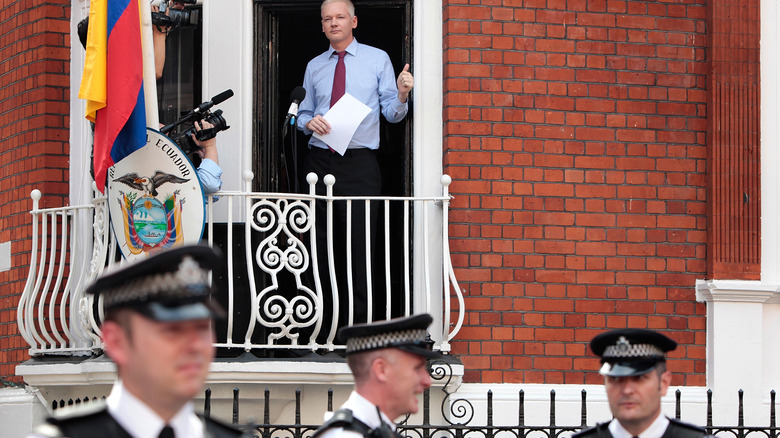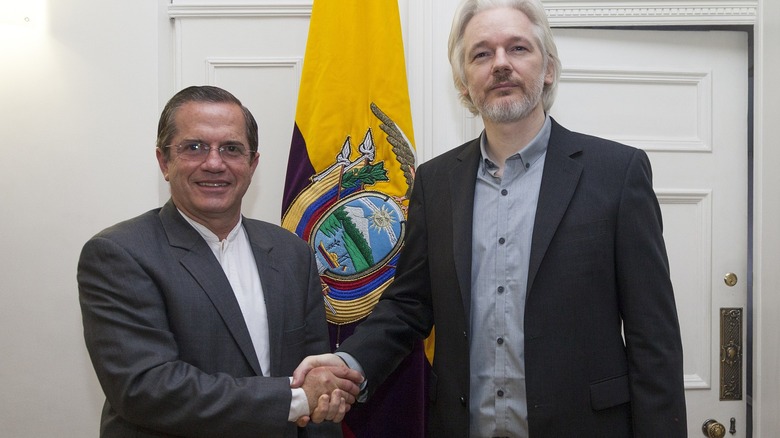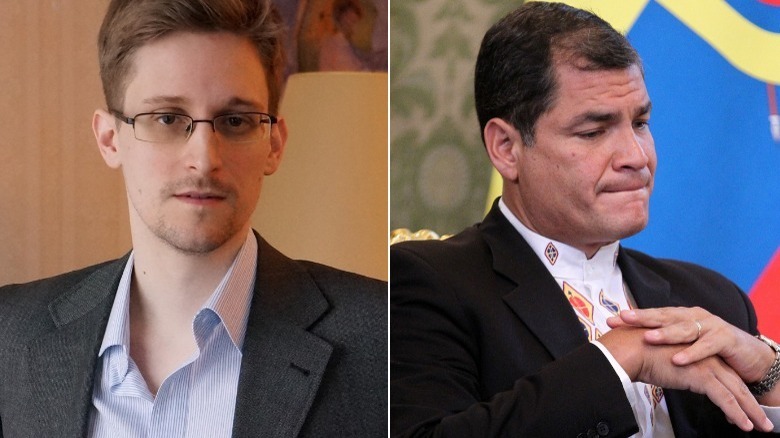Why Did Edward Snowden Seek Asylum In Ecuador?
In 2013, as The Guardian reported, Edward Snowden (above, in 2018) leaked highly classified documents revealing the full extent of the National Security Agency's domestic surveillance programs. Soon after, per The New York Times, Snowden fled to Russia, where he remains today. If you know anything about Snowden, you probably knew those basic facts already. But here's something you probably didn't know: Snowden says that Russia was never his intended destination. In fact, Snowden claims that he was stranded in Russia en route to his actual destination: Ecuador.
Why Ecuador? What was it about the small South American nation that caught Snowden's attention? There were a few key factors that made Ecuador a logical place to seek asylum for a whistleblower like Snowden.
In 2006, NBC News reports, Edward Snowden began working for the CIA as an IT and cybersecurity expert, receiving top-secret clearance. Snowden spent the next few years at the CIA, and told The Guardian that he quickly became "disillusioned" with the work the agency was doing, and "realised that I was part of something that was doing far more harm than good." Snowden considered leaking information about unethical practices in the CIA, but chose not to, partly because he hoped that the election of Barack Obama would lead to a reform of the agency. In 2009, The Guardian continues, Snowden left the CIA, taking a job with a private contractor which stationed him at an NSA facility. He was even more shocked by what he found there.
After Snowden leaked classified documents, he planned to flee to Ecuador
According to his interview with The Guardian, Snowden discovered that the NSA's surveillance program was far bigger than he had realized, secretly collecting vast amounts of data on the private communications of average citizens. Furthermore, while Snowden had hoped that programs like these would shrink under the Obama administration, every indication suggested that they were continuing to expand.
In December 2012, per NBC News, Snowden reached out to Glenn Greenwald, a journalist for The Guardian. In June of 2013, Snowden and Greenwald met in Hong Kong, where Snowden turned over a large number of classified documents that he had smuggled out of his NSA facility. On June 6, The Guardian first began publishing articles based on the documents they obtained from an "anonymous" source. A few days later, The Guardian published that source's identity — Edward Snowden — at Snowden's own request. Snowden's deeply illegal leaks immediately made him a wanted criminal, as he expected. But Snowden had a plan: to gain asylum in Ecuador.
Ecuador made sense as Snowden's top choice for a few reasons. The first was Ecuador's president, Rafael Correa. According to Britannica, Correa served as Ecuador's president from 2007 to 2017. The Washington Post reports that Correa was (mostly) on the political left, focusing his presidential terms on advancing a "socialist political platform." Correa was also highly critical of the American government's involvement in Latin American affairs; according to teleSUR, Correa accused the CIA of trying to destabilize Ecuador during his presidency.
Ecuador had granted asylum to other document leakers, like Julian Assange
Naturally, as someone deeply critical of the American government, President Rafael Correa supported the actions of document-leakers like Snowden who revealed the secrets of American intelligence agencies. In fact, if Snowden had made it to Ecuador, he wouldn't have been the first whistleblower that the Correa administration had sheltered.
In 2012 — a year before Snowden's leaks — the Ecuadorian government offered asylum to Julian Assange, The Guardian reports. Assange is best-known as the founder of Wikileaks (says NBC News), an organization that publishes leaked, classified documents. Per the BBC, in 2010, the Swedish government brought charges of sexual misconduct against Assange, and issued an international warrant for his arrest. According to Vox, Assange claimed that these charges were just a pretext for his being brought to Sweden, then extradited to the United States for his role in leaking American military documents.
The Ecuadorian government agreed with Assange, and chose to offer him asylum. In a statement (quoted by The Guardian), Ecuador's foreign minister praised Assange's "dedicated defense of freedom of expression and freedom of press" and said Ecuador offered Assange asylum because he "may become a victim of political persecution" if he were arrested. President Correa said that Assange could be housed in Ecuador's embassy in London "indefinitely," as Bloomberg reports. (That promise was upheld for many years, but not forever. In 2019, per CNN, Ecuador revoked Assange's asylum, allowing him to be arrested by British police.)
Assange helped Snowden coordinate his escape to Ecuador
As the New York Times reports, Julian Assange (above, right) now sits in a London prison, and may be extradited to the United States for his crimes. But in 2013, Ecuador was still dedicated to protecting Assange, making the nation look extremely hospitable to a whistleblower like Snowden who was seeking political asylum. In fact, after Snowden leaked classified NSA documents to the press, Assange personally assisted Snowden's attempt to flee to Ecuador.
When Snowden leaked those documents, he was in Hong Kong (per Insider), but he knew he couldn't stay there. In a 2019 interview with Democracy Now, Snowden said that Assange helped coordinate his attempted escape to a safer country. Assange spoke to the Ecuadorian consul in the London embassy where he was living, and got the consul to sign an emergency document of safe passage for Snowden. That document allowed Snowden to travel to Ecuador, where he could then formally apply for asylum.
A statement published by WikiLeaks around the same time said that the organization was helping Snowden reach "the Republic of Ecuador via a safe route." As the BBC reports, that "safe route" was supposed to take Snowden from Hong Kong to Russia to Cuba to, finally, Ecuador. (Such a circuitous route was necessary to ensure that Snowden wouldn't land in a country that would arrest him on behalf of the United States.)
Snowden claims that he was stranded in Russia en route to Ecuador
But once Snowden reached Russia, he discovered that his American passport was revoked, preventing him from leaving that country. At least, that's how Snowden told it to Democracy Now. Per The New Yorker, some experts have cast doubt on this framing, suggesting that Russia was actually Snowden's intended destination; Snowden's most vocal critics have accused him of being a Russian agent from the beginning. As Politico reports, even then-Secretary of State John Kerry said Snowden's assertion about being stranded in Russia was "a pretty dumb answer" for a "supposedly smart guy." In his own defense, Snowden has suggested (via Globo) that the U.S. government left him stuck in Moscow to purposefully make him look like an agent of the Russian government.
Even so, Snowden told Democracy Now that he was prepared for the possibility of having his passport revoked. Following the passport incident, Snowden spent the next 40 days in a Russian airport applying for asylum to several different countries.
The Guardian reports that Snowden sent asylum applications to 21 countries in total — mostly nations in Latin American and Europe. Almost all said "No" immediately. Some — like Ecuador — said that they would only consider Snowden's asylum application if he applied in person while within their nation's territory. Ecuador had initially planned to help Snowden escape Moscow to Ecuador (which is why they issued that "safe travel" document), but the nation later backed down on the idea.
Snowden now believes Ecuador couldn't have protected him from the U.S. government
Per The Washington Post, Ecuador's decision not to help Snowden escape Russia followed a call between then-Vice President Joe Biden and Ecuadorian President Rafael Correa (above, right), in which Biden told Correa that Ecuadorian-American relations would "strongly deteriorate" if Ecuador offered Snowden asylum. Ecuador announced that they'd still consider Snowden's application if he made it to Ecuadorian territory, but also noted that he wouldn't be allowed to travel to Ecuador without an American Passport — which was basically a roundabout way of turning Snowden down.
Eventually, Snowden gave up on seeking asylum from Ecuador (and elsewhere), deciding that he'd be better off in Russia anyway. Speaking to The New Yorker in 2014, Snowden said "the CIA has a very powerful presence [in Latin America] and the governments and the security services there are relatively much less capable than, say, Russia," adding that the CIA "could've basically snatched me."
The New York Times reported that Snowden applied for asylum from Russia, and Russia offered him one year of asylum starting in 2013. That single year of asylum was continually renewed, and was upgraded to "permanent residency" in 2020, CNN reports. That same year, per NPR, Snowden and his wife announced plans to apply for Russian citizenship. "My wife and I have no desire to be separated from our son. That's why, in this era of pandemics and closed borders, we're applying for dual US-Russian citizenship," Snowden wrote on Twitter. No word yet on whether that citizenship application has been approved.





